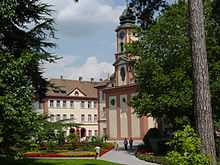Mainau
| Nickname: Blumeninsel (flower island) | |
|---|---|
 The palace gardens at Mainau were mainly created by Lennart Bernadotte | |
 Mainau Mainau (Germany)
| |
| Geography | |
| Location | Lake Constance |
| Coordinates | 47°42′20″N 9°11′40″E / 47.70556°N 9.19444°ECoordinates: 47°42′20″N 9°11′40″E / 47.70556°N 9.19444°E |
| Area | 0.447584 km2 (0.172813 sq mi) |
| Length | 1.1 km (0.68 mi) |
| Width | 0.61 km (0.379 mi) |
| Coastline | 3.2 km (1.99 mi) |
| Highest elevation | 425 m (1,394 ft) |
| Highest point | Schloßhügel |
| Country | |
|
Germany | |
| State |
|
| District | Konstanz |
| Municipality | Konstanz |
| Ward | Litzelstetten |
| Demographics | |
| Population | 185 (as of 2008) |
| Density | 413.3 /km2 (1,070.4 /sq mi) |
| Additional information | |
| Official website | www.mainau.de |
| Private property owned by Lennart Bernadotte-Stiftung | |

![]() Mainau (help·info) is an island in Lake Constance (on the south shore of the Überlinger See near the city of Konstanz, Baden-Württemberg, Germany). It is maintained as a garden island and a model of excellent environmental practices. Administratively, the island has been a part of Konstanz since December 1, 1971, when the municipality of Litzelstetten, of which Mainau was part, was incorporated into Konstanz. Mainau is still part of Litzelstetten, now one of 15 wards (administrative subdivisions) of Konstanz.
Mainau (help·info) is an island in Lake Constance (on the south shore of the Überlinger See near the city of Konstanz, Baden-Württemberg, Germany). It is maintained as a garden island and a model of excellent environmental practices. Administratively, the island has been a part of Konstanz since December 1, 1971, when the municipality of Litzelstetten, of which Mainau was part, was incorporated into Konstanz. Mainau is still part of Litzelstetten, now one of 15 wards (administrative subdivisions) of Konstanz.
The island belongs to the Lennart Bernadotte-Stiftung (English: the Lennart Bernadotte Foundation),[1] an entity created by Prince Lennart, Count Bernadotte af Wisborg, formerly a Prince of Sweden and Duke of Småland.[2] It is one of the main tourist attractions of Lake Constance. Beside flowers there is a park landscape with views on the lake. There is also a greenhouse with tropical climate and thousands of butterflies.
Mainau Bay is the location of the university sailing club.
History
Until the Napoleonic mediatisations and secularisations of small German fiefs this island belonged to the Order of Teutonic Knights. It was later sold into private ownership. In 1853 Grand Duke Frederick I of Baden purchased the island as his personal property and built a summer palace there. At the end of World War I Baden became a republic with the abdication of Grand Duke Frederick II, son of Frederick I. The former Grand Duke retained his private property including Mainau. When he died childless in 1928 the island passed to his sister Victoria of Baden, wife of King Gustaf V of Sweden. Upon her death two years later she bequeathed the island to her second son Prince Vilhelm, Duke of Södermanland and his descendants. In 1932 Prince Wilhem gave Mainau to his only child Count Lennart Bernadotte who owned it until 1974 when he transferred the island to a foundation. Count Bernadotte formed Enterprise Mainau GmbH in 1991 as a private enterprise to manage the island for the benefit of the Lennart Bernadotte-Stiftung. The Count remained active in managing Mainau until his death in 2004 but appointed his second wife Sonja co-manager in 2001. Lennart's widow Sonja Countess Bernadotte af Wisborg and his children ran both the foundation and the management company until 2007. Since January 2007 Bettina Bernadotte, the eldest daughter of Lennart and Sonja Bernadotte, directs the Mainau GmbH as the current manager.[3]
Parks and gardens

Mainau is a "flowering island" notable for its parks and gardens. Frederick I, Grand Duke of Baden, created the island's arboretum, which now contains 500 species of deciduous and coniferous trees, many exotic and valuable, including fine specimens of Sequoiadendron giganteum (1864) and Metasequoia glyptostroboides (1952). The island also contains about 200 rhododendron and azalea varieties.
The Italian Rose Garden laid out geometrically with pergolas, sculptures, and fountains, and includes some 500 rose varieties. The Mediterranean terraces contain exotic pot plants, including palm trees, agaves, cacti, and Bougainvillea. The island as a whole contains about 30,000 rose bushes representing 1,200 varieties, and about 20,000 dahlias of 250 varieties.
Further reading
- Mainau Island (official website)
- Information and pictures about Mainau
- Mainau: A lot of pictures
- Mainau: An article and pictures
Gallery
-

-

-

-

-

-

-

-

-

-

-

-

-

-

-

-

-

-

The Castle in spring 2008
References
| Wikimedia Commons has media related to Mainau. |
- ↑ http://www.mainau.de/htdocs/en/0105.htm
- ↑ http://www.mainau.de/htdocs/en/0104_2.htm]
- ↑ "Insel Mainau: Mainau GmbH" (in German). Retrieved 19 July 2011.